真实条件句和非真实条件句
虚拟条件句的三种基本类型:与现在事实相反、与过去事实相反、与将来事实相反。
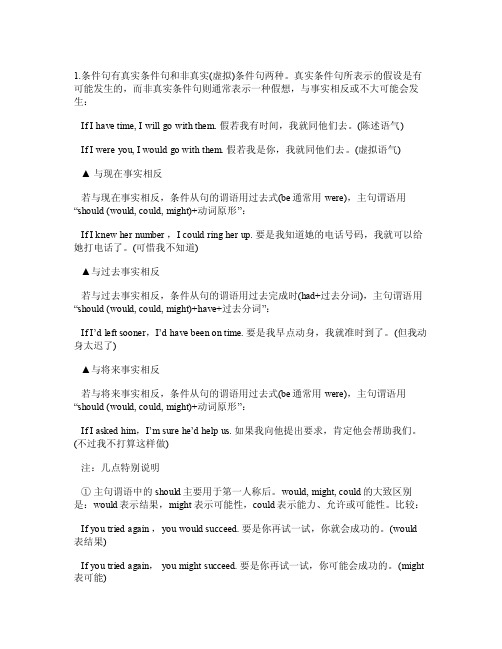
1.条件句有真实条件句和非真实(虚拟)条件句两种。
真实条件句所表示的假设是有可能发生的,而非真实条件句则通常表示一种假想,与事实相反或不大可能会发生:If I have time, I will go with them. 假若我有时间,我就同他们去。
(陈述语气)If I were you, I would go with them. 假若我是你,我就同他们去。
(虚拟语气)▲ 与现在事实相反若与现在事实相反,条件从句的谓语用过去式(be通常用were),主句谓语用“should (would, could, might)+动词原形”:If I knew her number ,I could ring her up. 要是我知道她的电话号码,我就可以给她打电话了。
(可惜我不知道)▲与过去事实相反若与过去事实相反,条件从句的谓语用过去完成时(had+过去分词),主句谓语用“should (would, could, might)+have+过去分词”:If I’d left sooner,I’d have been on t ime. 要是我早点动身,我就准时到了。
(但我动身太迟了)▲与将来事实相反若与将来事实相反,条件从句的谓语用过去式(be通常用were),主句谓语用“should (would, could, might)+动词原形”:If I asked him,I’m sure he’d help us. 如果我向他提出要求,肯定他会帮助我们。
(不过我不打算这样做)注:几点特别说明①主句谓语中的should主要用于第一人称后。
would, might, could的大致区别是:would表示结果,might表示可能性,could表示能力、允许或可能性。
比较:If you tried again ,you would succeed. 要是你再试一试,你就会成功的。
(would 表结果)If you tried again, you might succeed. 要是你再试一试,你可能会成功的。
if 引导的条件句
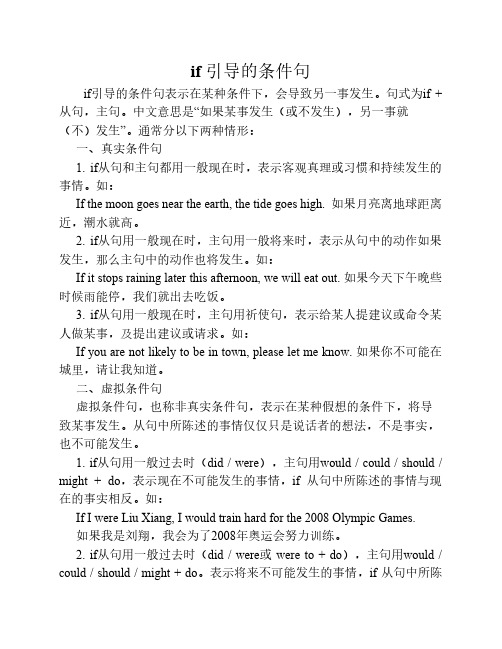
if 引导的条件句if引导的条件句表示在某种条件下,会导致另一事发生。
句式为if +从句,主句。
中文意思是“如果某事发生(或不发生),另一事就(不)发生”。
通常分以下两种情形:一、真实条件句1. if从句和主句都用一般现在时,表示客观真理或习惯和持续发生的事情。
如:If the moon goes near the earth, the tide goes high. 如果月亮离地球距离近,潮水就高。
2. if从句用一般现在时,主句用一般将来时,表示从句中的动作如果发生,那么主句中的动作也将发生。
如:If it stops raining later this afternoon, we will eat out. 如果今天下午晚些时候雨能停,我们就出去吃饭。
3. if从句用一般现在时,主句用祈使句,表示给某人提建议或命令某人做某事,及提出建议或请求。
如:If you are not likely to be in town, please let me know. 如果你不可能在城里,请让我知道。
二、虚拟条件句虚拟条件句,也称非真实条件句,表示在某种假想的条件下,将导致某事发生。
从句中所陈述的事情仅仅只是说话者的想法,不是事实,也不可能发生。
1. if从句用一般过去时(did / were),主句用would / could / should / might + do,表示现在不可能发生的事情,if 从句中所陈述的事情与现在的事实相反。
如:If I were Liu Xiang, I would train hard for the 2008 Olympic Games.如果我是刘翔,我会为了2008年奥运会努力训练。
2. if从句用一般过去时(did / were或 were to + do),主句用would / could / should / might + do。
表示将来不可能发生的事情,if 从句中所陈述的事情与将来的事实相反。
深入解读语法条件句的种类与结构

深入解读语法条件句的种类与结构条件句是英语语法中一个重要的概念,用于描述某个动作或情况的发生与否对另一个动作或情况发生的影响关系。
具体而言,条件句又可根据语法结构的不同进行分类。
本文将深入解读语法条件句的种类与结构,帮助读者更好地理解和运用条件句。
1. 真实条件句(Type 1 Conditional Sentences)真实条件句是描述现在或将来的可能发生的情况,其结构为:if +简单现在时,将来时。
例如:If it rains, we will stay indoors.(如果下雨的话,我们将呆在室内。
)在真实条件句中,主句使用将来时表达对条件成立的反应。
2. 非真实条件句(Type 2 Conditional Sentences)非真实条件句用于描述对现在或将来可能发生的情况的假设或不可能发生的情况。
其结构为:if + 过去时,虚拟语气(would/could + 动词原形)。
例如:If I were rich, I would travel the world.(如果我有钱的话,我会周游世界。
)在非真实条件句中,主句使用虚拟语气来表达对条件不成立的反应。
3. 条件交替句(Type 3 Conditional Sentences)条件交替句用于描述过去的情况,表示与过去事实相反的条件与结果。
其结构为:if + 过去完成时,过去完成时。
例如:If I had studied harder, I would have passed the exam.(如果我学得更努力一些,我就会通过考试。
)在条件交替句中,主句使用过去完成时来表示与过去事实相反的结果。
4. 零条件句(Zero Conditional Sentences)零条件句用于描述普遍真理或自然规律,其结构为:if + 简单现在时,简单现在时。
例如:If you heat ice, it melts.(如果你加热冰,它会融化。
)在零条件句中,主句使用简单现在时来表达普遍真理或自然规律。
虚拟条件句的三种基本类型 与现在事实相反 与过去事实相反 与将来事实相反

1.条件句有真实条件句和非真实(虚拟)条件句两种。
真实条件句所表示的假设是有可能发生的,而非真实条件句则通常表示一种假想,与事实相反或不大可能会发生:If I have time, I will go with them. 假若我有时间,我就同他们去。
(陈述语气)If I were you, I would go with them. 假若我是你,我就同他们去。
(虚拟语气)▲ 与现在事实相反若与现在事实相反,条件从句的谓语用过去式(be通常用were),主句谓语用“should (would, could, might) 动词原形”:If I knew her number ,I could ring her up. 要是我知道她的电话号码,我就可以给她打电话了。
(可惜我不知道)▲与过去事实相反若与过去事实相反,条件从句的谓语用过去完成时(had 过去分词),主句谓语用“should (would, could, might) have 过去分词”:If I’d lef t sooner,I’d have been on time. 要是我早点动身,我就准时到了。
(但我动身太迟了)▲与将来事实相反若与将来事实相反,条件从句的谓语用过去式(be通常用were),主句谓语用“should (would, could, might) 动词原形”:If I asked him,I’m sure he’d help us. 如果我向他提出要求,肯定他会帮助我们。
(不过我不打算这样做)注:几点特别说明① 主句谓语中的should主要用于第一人称后。
would, might, could的大致区别是:would表示结果,might表示可能性,could表示能力、允许或可能性。
比较:If you tried again ,you would succeed. 要是你再试一试,你就会成功的。
(would表结果)If you tried again, you might succeed. 要是你再试一试,你可能会成功的。
if引导的条件句是什么从句

if引导的条件句是什么从句if 引导的条件句有真实条件句和非真实条件句两种;1、真实条件句:叙述真实可能发生的事情;例句:If you fail in the exam,you will let him down.如果你考试不及格,你会让他失望的。
扩展资料2、非真实条件句:虚拟语气的一种,表示与实际已发生事实相反:例句:If I were you, I would invite him.如果我是你,我会邀请他。
3、另一个常用连词为unless,大多数时候意思与 if not 相近:例句:Let's go out for a walk unless you are too tired.我们出去散步吧,除非你太累了。
例句:If you are not too tired, let's go out for a walk.如果你不太累,我们出去散步吧。
条件状语从句的基本用法1、用if引导:if意为“如果”。
例句:If you cheat in the exam you’ll never get away with it.考试作弊必予追究。
2、用unless引导:unless的意思是“如果不”“除非”。
例句:Unless you go at once you will be late.如果你不马上走,就会迟到的'。
3、用as [so] long as引导:as [so] long as的意思是“如果”“只要”。
例句:I’ll remember that day as long as I live.只要我活着,我就不会忘记那个日子。
4、用in case引导:in case用连词引导条件状语从句时,其意为“如果”“万一”。
例句:In case I forget, please remind me about it.万一我忘记,请提醒我一下。
5、条件状语从句的时态:当主句为将来时态或含有将来意义时,条件状语从句习惯上要用一般现在时表示将来意义,而不能直接使用将来时态。
初中英语中的条件句与虚拟条件句用法
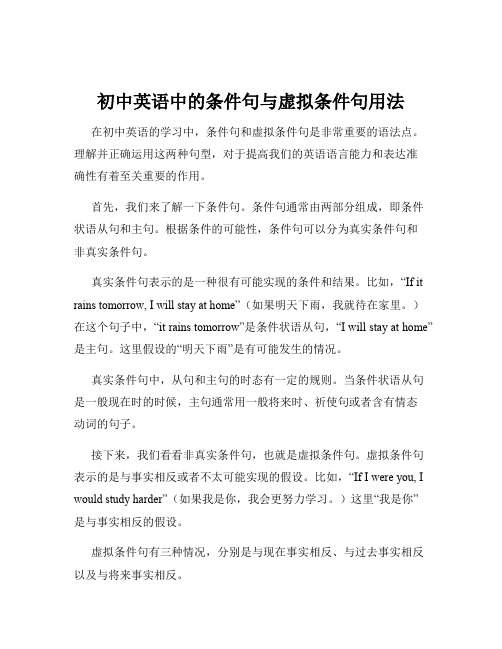
初中英语中的条件句与虚拟条件句用法在初中英语的学习中,条件句和虚拟条件句是非常重要的语法点。
理解并正确运用这两种句型,对于提高我们的英语语言能力和表达准确性有着至关重要的作用。
首先,我们来了解一下条件句。
条件句通常由两部分组成,即条件状语从句和主句。
根据条件的可能性,条件句可以分为真实条件句和非真实条件句。
真实条件句表示的是一种很有可能实现的条件和结果。
比如,“If it rains tomorrow, I will stay at home”(如果明天下雨,我就待在家里。
)在这个句子中,“it rains tomorrow”是条件状语从句,“I will stay at home”是主句。
这里假设的“明天下雨”是有可能发生的情况。
真实条件句中,从句和主句的时态有一定的规则。
当条件状语从句是一般现在时的时候,主句通常用一般将来时、祈使句或者含有情态动词的句子。
接下来,我们看看非真实条件句,也就是虚拟条件句。
虚拟条件句表示的是与事实相反或者不太可能实现的假设。
比如,“If I were you, I would study harder”(如果我是你,我会更努力学习。
)这里“我是你”是与事实相反的假设。
虚拟条件句有三种情况,分别是与现在事实相反、与过去事实相反以及与将来事实相反。
与现在事实相反的虚拟条件句,从句用一般过去时(be 动词用were),主句用“would / could / should / might +动词原形”。
例如:“If I had enough money now, I would buy a new car”(如果我现在有足够的钱,我会买一辆新车。
)但实际上“我现在没有足够的钱”。
与过去事实相反的虚拟条件句,从句用过去完成时,主句用“would/ could / should / might + have +过去分词”。
比如:“If you had come earlier, you would have caught the bus”(如果你来得早一点,你就赶上公交车了。
真实条件句VS非真实条件句23页文档

45、自己的饭量自己知道。——苏联
真实条件句VS非真实条件句
56、极端的法规,就是极端的不公。 ——西 塞罗 57、法律一旦成为人们的需要,人们 就不再 配享受 自由了 。—— 毕达哥 拉斯 58、法律规定的惩罚不是为了私人的 利益, 而是为 了公共 的利益 ;一部 分靠有 害的强 制,9、假如没有法律他们会更快乐的话 ,那么 法律作 为一件 无用之 物自己 就会消 灭。— —洛克
60、人民的幸福是至高无个的法。— —西塞 罗
41、学问是异常珍贵的东西,从任何源泉吸 收都不可耻。——阿卜·日·法拉兹
42、只有在人群中间,才能认识自 己。——德国
43、重复别人所说的话,只需要教育; 而要挑战别人所说的话,则需要头脑。—— 玛丽·佩蒂博恩·普尔
条件句有真实条件句与非真实条件句两种

条件句有真实条件句与非真实条件句两种
●真实条件句(第一类条件句)所表的假设是可能发生或实现的,句中的条件从句与结果主句皆用直陈语气。
●非真实条件句所表的假设则是不可能或不太可能发生或实现的,句中的条件从句与结果主句皆须用虚拟语气。
1.与现在事实相反(第二类条件句)条件从句用If +动词过去式(be的过去式用were),
结果主句用should/would+动词原形。
谈论想像中的情况或描写完全不可能的事。
2.与将来事实相反(第二类条件句)条件从句If+动词过去式(be的过去式用were)结果
主句用should/would+动词原形。
第二类的形式与第一类不同,If从句中用一般过去时,谈论想像的情况,主句用would+动词原形,推测想像的结果。
尽管第二类使用过去时,却并非指过去的时间,所以,If之后的过去时用法常被称为“非真实的过去”
3.与过去事实相反(第三类条件句称为“假设条件句”),条件从句If +had+过去分词,结
果主句用should/ would +have+过去分词。
第三类条件句在If从句里设想纯粹想像的事情,在主句里讲述想像的结果。
它与第二类条件句有一定的相似之处。
但是,第三类所谈论的是没有或永远不可能有的结果。
因为它们指的是去没有过的事情。
(在If从句中可用could have+过去分词代替,或had been able to+动词原形)。
条件句的种类及用法
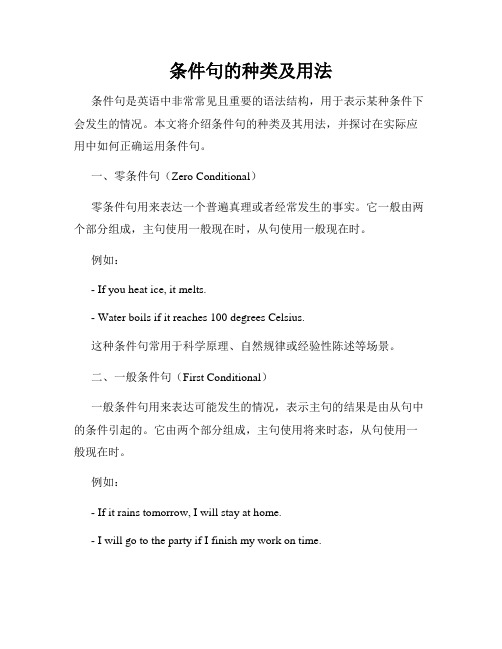
条件句的种类及用法条件句是英语中非常常见且重要的语法结构,用于表示某种条件下会发生的情况。
本文将介绍条件句的种类及其用法,并探讨在实际应用中如何正确运用条件句。
一、零条件句(Zero Conditional)零条件句用来表达一个普遍真理或者经常发生的事实。
它一般由两个部分组成,主句使用一般现在时,从句使用一般现在时。
例如:- If you heat ice, it melts.- Water boils if it reaches 100 degrees Celsius.这种条件句常用于科学原理、自然规律或经验性陈述等场景。
二、一般条件句(First Conditional)一般条件句用来表达可能发生的情况,表示主句的结果是由从句中的条件引起的。
它由两个部分组成,主句使用将来时态,从句使用一般现在时。
例如:- If it rains tomorrow, I will stay at home.- I will go to the party if I finish my work on time.一般条件句常用于描述将来的情况,主要用于个人计划、决策和假设等情景。
三、非真实条件句(Second Conditional)非真实条件句用来表达与事实相反的条件或不太可能发生的情况。
这种条件句由两个部分组成,主句使用would/could/might + 动词原形,从句使用过去时态。
例如:- If I had a million dollars, I would travel around the world.- If I were you, I would take the job.非真实条件句常用于表达假设、愿望和建议等,并且与当前事实相反。
四、虚拟条件句(Third Conditional)虚拟条件句用于表达对过去发生的事情的假设,通常用于过去的事件,与事实相反。
主句使用过去完成时,从句使用过去完成时。
条件句的种类与条件状语从句的用法
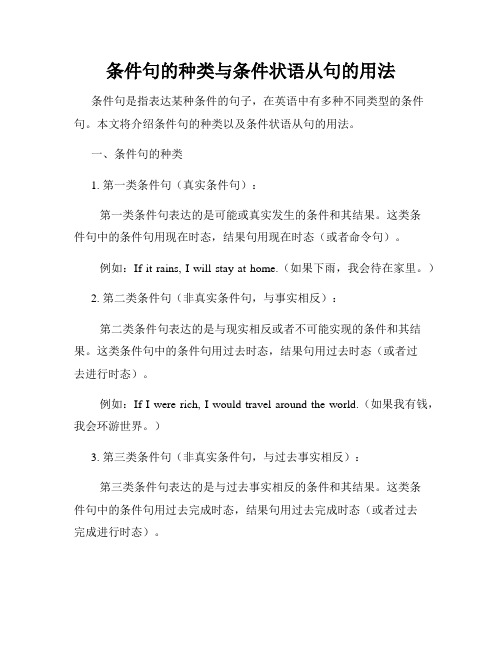
条件句的种类与条件状语从句的用法条件句是指表达某种条件的句子,在英语中有多种不同类型的条件句。
本文将介绍条件句的种类以及条件状语从句的用法。
一、条件句的种类1. 第一类条件句(真实条件句):第一类条件句表达的是可能或真实发生的条件和其结果。
这类条件句中的条件句用现在时态,结果句用现在时态(或者命令句)。
例如:If it rains, I will stay at home.(如果下雨,我会待在家里。
)2. 第二类条件句(非真实条件句,与事实相反):第二类条件句表达的是与现实相反或者不可能实现的条件和其结果。
这类条件句中的条件句用过去时态,结果句用过去时态(或者过去进行时态)。
例如:If I were rich, I would travel around the world.(如果我有钱,我会环游世界。
)3. 第三类条件句(非真实条件句,与过去事实相反):第三类条件句表达的是与过去事实相反的条件和其结果。
这类条件句中的条件句用过去完成时态,结果句用过去完成时态(或者过去完成进行时态)。
例如:If I had studied harder, I would have passed the exam.(如果我学习更努力,我就能通过考试。
)4. 第四类条件句(非真实条件句,与将来事实相反):第四类条件句表达的是与将来事实相反的条件和其结果。
这类条件句中的条件句用将来完成时态,结果句用将来完成时态(或者将来完成进行时态)。
例如:If you don't hurry up, you will have missed the train.(如果你不赶快,你将会错过火车。
)二、条件状语从句的用法条件状语从句是一种特殊的从句,在复合句中充当条件状语。
它通过表达某种条件来表达结果。
条件状语从句通常由关联词引导,常见的关联词有if,unless,as long as等。
1. 使用"if"引导条件状语从句:条件状语从句可以由"if"引导,表示如果某条件成立,就会发生某种结果。
条件句
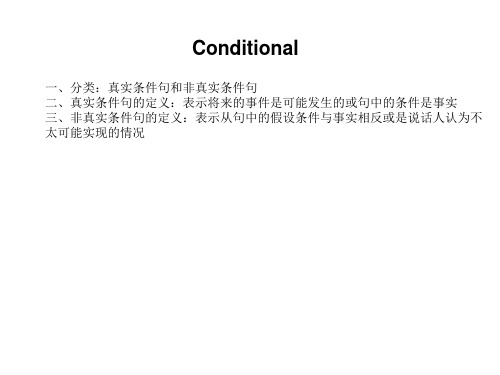
Unreal conditional: type 3
从句 与现在事实相反 一般过去式 主句 Wou动词原形 Would/should/cou ld/might +have done
与过去事实相反
Had done
与将来事实相反
Were to Would/should/cou do/should do/动词 ld/might+动词原形 过去式
Real conditional
type2
二、Variant form: if+ should/will/would+动词原形,主句will/shall/would etc,+动词原形 E g:if It should rain again, the flowers will bloom(表委婉语气) E g:if my father will give me permission, I shall spend a few months abroad (表意愿) 三、Alternative form:以并列结构表条件意义 E g:set your alarm clock, and you won’t oversleep.=if you set your alarm clock, you won’t oversleep E g: set your alarm clock, or (else) you will oversleep.=if you don’t set your alarm clock, you will oversleep
E g:if I were you, I would go to the cinema E g: if we had caught the 10o’clock train, we would have got there by lunch-time E g: if I should be a teacher, I would do my job well
If条件句和虚拟语气
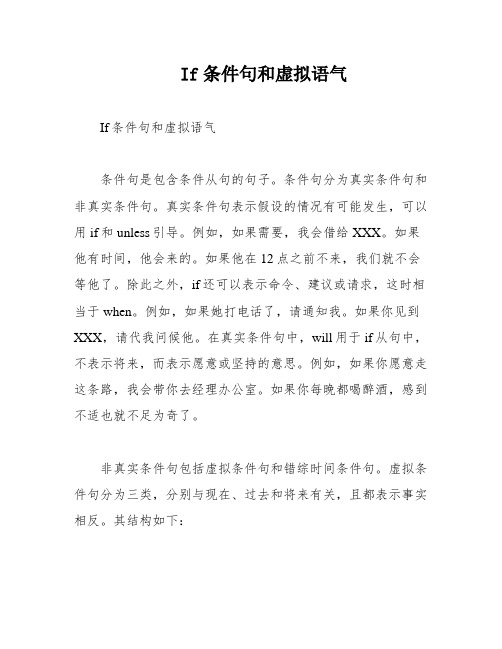
If条件句和虚拟语气
If条件句和虚拟语气
条件句是包含条件从句的句子。
条件句分为真实条件句和非真实条件句。
真实条件句表示假设的情况有可能发生,可以用if和unless引导。
例如,如果需要,我会借给XXX。
如果他有时间,他会来的。
如果他在12点之前不来,我们就不会等他了。
除此之外,if还可以表示命令、建议或请求,这时相当于when。
例如,如果她打电话了,请通知我。
如果你见到XXX,请代我问候他。
在真实条件句中,will用于if从句中,不表示将来,而表示愿意或坚持的意思。
例如,如果你愿意走这条路,我会带你去经理办公室。
如果你每晚都喝醉酒,感到不适也就不足为奇了。
非真实条件句包括虚拟条件句和错综时间条件句。
虚拟条件句分为三类,分别与现在、过去和将来有关,且都表示事实相反。
其结构如下:
1.与现在事实相反:If+主语+动词的一般过去,主语
+would/could/might时(be动词一般用were)+动词原形。
2.与过去事实相反:If+主语+had+过去分词,主语+XXX
过去分词。
3.与将来事实相反:If+主语+一般过去时,主语+XXX动
词原形。
如果主语是were,则可以用虚拟语气来表示。
例如,如果我有更多的钱,我会去旅行。
在虚拟条件句中,条件从句的结果用主句来表示。
错综时间条件句则比较复杂,不在本文讨论范围内。
初中英语知识点归纳条件句的真实与非真实条件
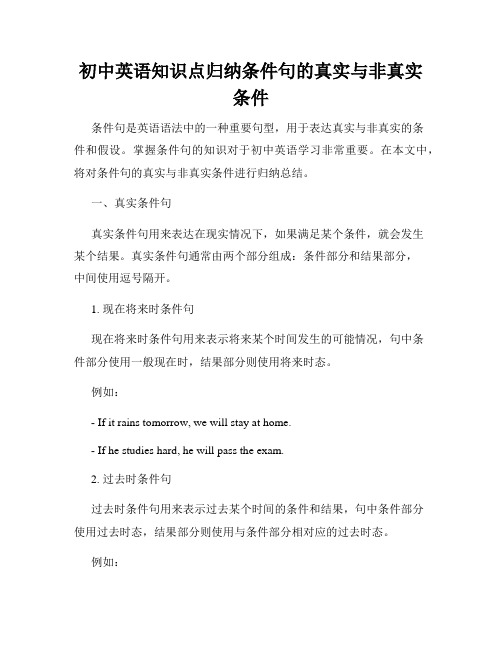
初中英语知识点归纳条件句的真实与非真实条件条件句是英语语法中的一种重要句型,用于表达真实与非真实的条件和假设。
掌握条件句的知识对于初中英语学习非常重要。
在本文中,将对条件句的真实与非真实条件进行归纳总结。
一、真实条件句真实条件句用来表达在现实情况下,如果满足某个条件,就会发生某个结果。
真实条件句通常由两个部分组成:条件部分和结果部分,中间使用逗号隔开。
1. 现在将来时条件句现在将来时条件句用来表示将来某个时间发生的可能情况,句中条件部分使用一般现在时,结果部分则使用将来时态。
例如:- If it rains tomorrow, we will stay at home.- If he studies hard, he will pass the exam.2. 过去时条件句过去时条件句用来表示过去某个时间的条件和结果,句中条件部分使用过去时态,结果部分则使用与条件部分相对应的过去时态。
例如:- If you called me yesterday, I didn't hear the phone.- If I had enough money, I would have bought a new car.二、非真实条件句非真实条件句用来表达与现实相反的情况,即虚拟的条件和假设。
非真实条件句通常由两个部分组成:条件部分和结果部分,中间使用逗号隔开。
1. 与现在事实相反的虚拟条件句与现在事实相反的虚拟条件句用来表达与现在事实相反的假设情况或不可能发生的情况。
句中条件部分使用过去时态,结果部分使用情态动词"would + 动词原形"。
例如:- If I were a bird, I would fly in the sky.- If I had a lot of money, I would travel around the world.2. 与过去事实相反的虚拟条件句与过去事实相反的虚拟条件句用来表示与过去事实相反的假设情况或不可能发生的情况。
条件状从句
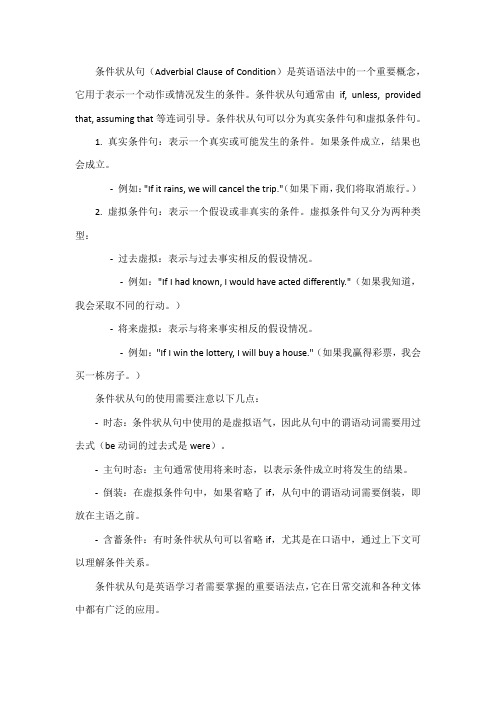
条件状从句(Adverbial Clause of Condition)是英语语法中的一个重要概念,它用于表示一个动作或情况发生的条件。
条件状从句通常由if, unless, provided that, assuming that等连词引导。
条件状从句可以分为真实条件句和虚拟条件句。
1. 真实条件句:表示一个真实或可能发生的条件。
如果条件成立,结果也会成立。
-例如:"If it rains, we will cancel the trip."(如果下雨,我们将取消旅行。
)2. 虚拟条件句:表示一个假设或非真实的条件。
虚拟条件句又分为两种类型:-过去虚拟:表示与过去事实相反的假设情况。
-例如:"If I had known, I would have acted differently."(如果我知道,我会采取不同的行动。
)-将来虚拟:表示与将来事实相反的假设情况。
-例如:"If I win the lottery, I will buy a house."(如果我赢得彩票,我会买一栋房子。
)条件状从句的使用需要注意以下几点:-时态:条件状从句中使用的是虚拟语气,因此从句中的谓语动词需要用过去式(be动词的过去式是were)。
-主句时态:主句通常使用将来时态,以表示条件成立时将发生的结果。
-倒装:在虚拟条件句中,如果省略了if,从句中的谓语动词需要倒装,即放在主语之前。
-含蓄条件:有时条件状从句可以省略if,尤其是在口语中,通过上下文可以理解条件关系。
条件状从句是英语学习者需要掌握的重要语法点,它在日常交流和各种文体中都有广泛的应用。
高中语法要点条件句的真实与非真实条件
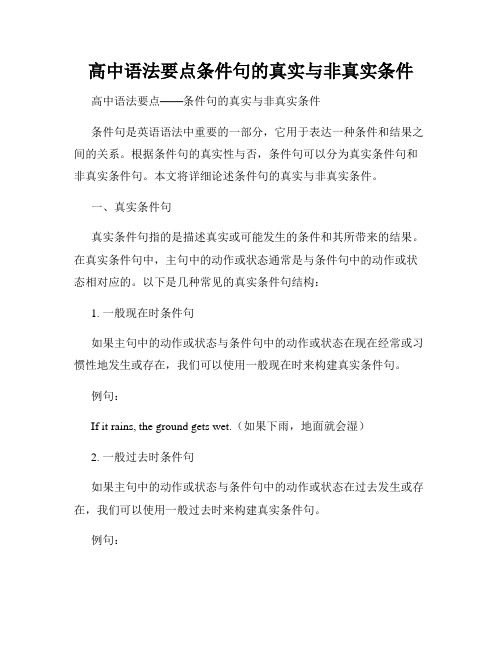
高中语法要点条件句的真实与非真实条件高中语法要点——条件句的真实与非真实条件条件句是英语语法中重要的一部分,它用于表达一种条件和结果之间的关系。
根据条件句的真实性与否,条件句可以分为真实条件句和非真实条件句。
本文将详细论述条件句的真实与非真实条件。
一、真实条件句真实条件句指的是描述真实或可能发生的条件和其所带来的结果。
在真实条件句中,主句中的动作或状态通常是与条件句中的动作或状态相对应的。
以下是几种常见的真实条件句结构:1. 一般现在时条件句如果主句中的动作或状态与条件句中的动作或状态在现在经常或习惯性地发生或存在,我们可以使用一般现在时来构建真实条件句。
例句:If it rains, the ground gets wet.(如果下雨,地面就会湿)2. 一般过去时条件句如果主句中的动作或状态与条件句中的动作或状态在过去发生或存在,我们可以使用一般过去时来构建真实条件句。
例句:If I had money, I would buy a new car.(如果我有钱,我会买一辆新车)3. 一般将来时条件句如果主句中的动作或状态与条件句中的动作或状态将来肯定发生或存在,我们可以使用一般将来时来构建真实条件句。
例句:If it snows tomorrow, we will go skiing.(如果明天下雪,我们会去滑雪)二、非真实条件句非真实条件句指的是描述不可能或不真实的条件及其所带来的结果。
在非真实条件句中,主句中的动作或状态与条件句中的动作或状态相反或无关。
以下是几种常见的非真实条件句结构:1. 虚拟语气条件句虚拟语气条件句用于表达对过去和现在不可能实现的假设条件。
根据条件句中的情况,虚拟语气条件句可以分为三种类型:与现在事实相反、与过去事实相反和与将来事实相反。
- 与现在事实相反如果条件句中的情况与现在事实相反,我们使用过去时的虚拟语气(动词用过去式)。
例句:If I were you, I would help her.(如果我是你,我会帮助她)- 与过去事实相反如果条件句中的情况与过去事实相反,我们使用过去完成时的虚拟语气(had+过去分词)。
真实条件句和非真实条件句
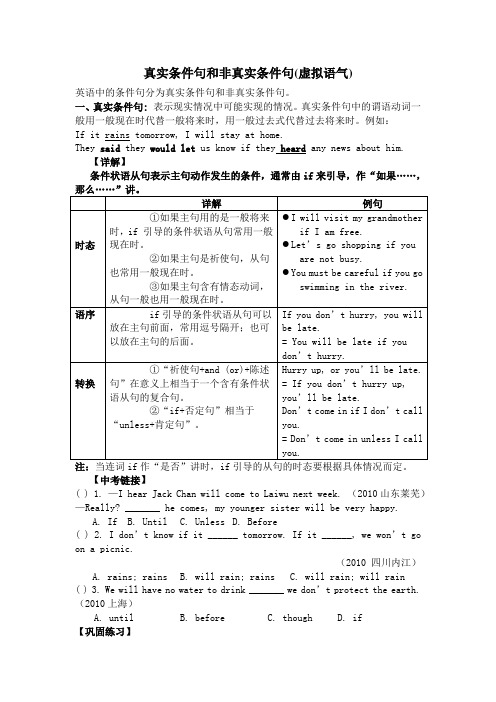
真实条件句和非真实条件句(虚拟语气)英语中的条件句分为真实条件句和非真实条件句。
一、真实条件句:表示现实情况中可能实现的情况。
真实条件句中的谓语动词一般用一般现在时代替一般将来时,用一般过去式代替过去将来时。
例如:If it rains tomorrow, I will stay at home.They said they would let us know if they heard any news about him.【详解】条件状语从句表示主句动作发生的条件,通常由if来引导,作“如果……,注:当连词if作“是否”讲时,if引导的从句的时态要根据具体情况而定。
【中考链接】( ) 1. —I hear Jack Chan will come to Laiwu next week. (2010山东莱芜)—Really? _______ he comes, my younger sister will be very happy.A. IfB. UntilC. UnlessD. Before( ) 2. I don’t know if it ______ tomorrow. If it ______, we won’t go on a picnic.(2010 四川内江)A. rains; rainsB. will rain; rainsC. will rain; will rain ( ) 3. We will have no water to drink _______ we don’t protect the eart h. (2010上海)A. untilB. beforeC. thoughD. if【巩固练习】Ⅰ. 单项选择( ) 1. We will stay at home if my aunt ______ to visit us tomorrow.A. comeB. comesC. will comeD. is coming( ) 2. —Do you know if he ______ to play basketball with us?—I think he will come if he ______ free tomorrow.A. comes; isB. comes; will beC. will come; isD. will come; will be( ) 3. You will keep healthy ______ you do more exercise, such as running and swimming.A. ifB. howC. beforeD. whereⅡ. 根据汉语意思完成下列句子,每空一词。
真实条件状语从句与非真实条件状语从句

真实条件状语从句与非真实条件状语从句eg .If he doesn’t hurry up, he will miss the bus. 如果他不快点,他将错过巴士。
( 真实条件状语)(不是虚拟语气)If he is free, he will ask me to tell stories. 如果他是空闲的,他会要求我讲故事。
(真实条件状语)(不是虚拟语气)If I were you, I would go at once.如果我是你,我马上就会去。
(非真实条件状语从句)If there were no air, people would die. 如果没有空气,人就会死亡。
(非真实条件状语从句)用法及动词形式1、表示与现在事实相反的情况:if+主语+过去时+其他+主语+should/would/could/might+do+其他例:1.If I were you, I would take an umbrella.如果我是你,我会带把伞。
(事实:我不可能是你)2.If I knew his telephone number, I would tell you. 如果我知道他的电话号码,我就会告诉你。
(事实:不知道)3.If there were no air or water, there would be no living things on the earth. 如果没有水和空气,地球上就不会有生物。
(事实:地球上既有空气也有水)4.If I had any money with me, I could lend you some. 如果我带钱了,我就会借给你些。
(事实:没带钱)5.If he studied harder, he might pass the exam.如果他再努力些,就能通过考试了。
(事实:没有努力2、表示与过去事实相反的情况if+主语+had done +其他+主语+should/would/could/might+havedone+其他例:1. If I had got there earlier, I should/could have met her.如果我早到那儿,我就会见到她。
if 引导的真实条件句和非真实条件句
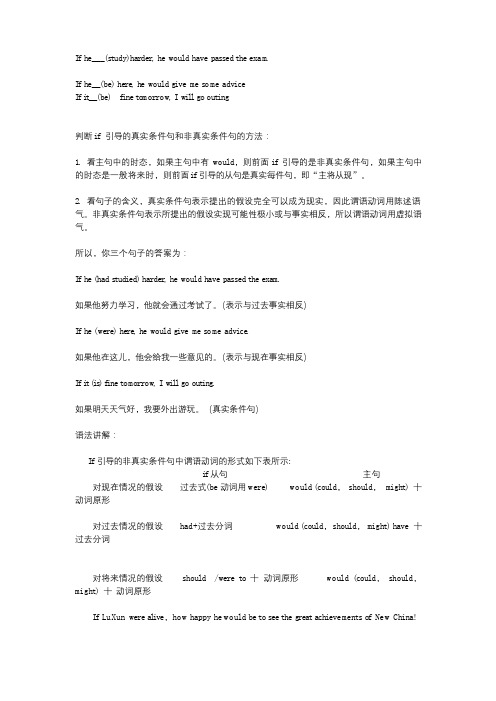
I f he___(s tudy)harder, he would have passed the exam.I f he__(be) he re, he would g ive me s o me adv iceI f i t__(be)f ine tom orrow,I wi l l go out ing判断i f引导的真实条件句和非真实条件句的方法:1.看主句中的时态,如果主句中有would,则前面i f引导的是非真实条件句,如果主句中的时态是一般将来时,则前面i f引导的从句是真实每件句,即“主将从现”。
2.看句子的含义,真实条件句表示提出的假设完全可以成为现实,因此谓语动词用陈述语气。
非真实条件句表示所提出的假设实现可能性极小或与事实相反,所以谓语动词用虚拟语气。
所以,你三个句子的答案为:I f he(had s tud ied)harder, he would have passed the exam.如果他努力学习,他就会通过考试了。
(表示与过去事实相反)I f he(were) he re, he would g ive me s o me adv ice.如果他在这儿,他会给我一些意见的。
(表示与现在事实相反)I f i t(i s)f ine tomorrow,I wi l l go ou t ing.如果明天天气好,我要外出游玩。
(真实条件句)语法讲解:I f引导的非真实条件句中谓语动词的形式如下表所示:i f从句主句对现在情况的假设过去式(be动词用were) would(cou ld,should,migh t)十动词原形对过去情况的假设had+过去分词would(cou ld,should,might) have 十过去分词对将来情况的假设should/were to十动词原形would (cou ld,should,might)十动词原形I f LuXun were a l ive,how happy he would be to see the g rea t ach ievements o f New China!如果鲁迅还活着,看到新中国的伟大成就他会多么高兴啊!I f the doc tor had been ava i l ab le,the ch i ld would have been saved.如果当时有医生在,这个小孩就会得救了。
- 1、下载文档前请自行甄别文档内容的完整性,平台不提供额外的编辑、内容补充、找答案等附加服务。
- 2、"仅部分预览"的文档,不可在线预览部分如存在完整性等问题,可反馈申请退款(可完整预览的文档不适用该条件!)。
- 3、如文档侵犯您的权益,请联系客服反馈,我们会尽快为您处理(人工客服工作时间:9:00-18:30)。
真实条件句和非真实条件句(虚拟语气)
英语中的条件句分为真实条件句和非真实条件句。
一、真实条件句:表示现实情况中可能实现的情况。
真实条件句中的谓语动词一般用一般现在时代替一般将来时,用一般过去式代替过去将来时。
例如:
If it rains tomorrow, I will stay at home.
They said they would let us know if they heard any news about him.
【详解】
条件状语从句表示主句动作发生的条件,通常由if来引导,作“如果……,那么……”讲。
注:当连词if作“是否”讲时,if引导的从句的时态要根据具体情况而定。
( ) 1. —I hear Jack Chan will come to Laiwu next week. (2010山东莱芜)
—Really? _______ he comes, my younger sister will be very happy.
A. If
B. Until
C. Unless
D. Before
( ) 2. I don’t know if it ______ tomorrow. If it ______, we won’t go on a picnic.
A. rains; rains
B. will rain; rains
C. will rain; will rain
( ) 3. We will have no water to drink _______ we don’t protect the earth. (2010上海)
A. until
B. before
C. though
D. if
【巩固练习】
Ⅰ. 单项选择
( ) 1. We will stay at home if my aunt ______ to visit us tomorrow.
A. come
B. comes
C. will come
D. is coming
( ) 2. —Do you know if he ______ to play basketball with us?
—I think he will come if he ______ free tomorrow.
A. comes; is
B. comes; will be
C. will come; is
D. will come; will be
( ) 3. You will keep healthy ______ you do more exercise, such as running and swimming.
A. if
B. how
C. before
D. where
Ⅱ. 根据汉语意思完成下列句子,每空一词。
4. 如果明天不下雨的话,我们将去动物园。
We will go to the zoo ______ ______ ______ ______ tomorrow.
5. 如果你完成了作业,我们就去下象棋。
______ ______ ______ ______ ______, let’s go to play chess.
6. 如果人人都能保护环境,世界将会变得更美好。
If everyone protects the environment, the world ______ ______ ______ ______.
二、非真实条件句: 也叫虚拟条件句,表示与现实情况相反的假设情况。
主句和从句中的谓语动词都需要使用虚拟语气。
在表示与事实相反的虚拟语气时,谓语动词有三种形式。
其具体形式如下:
时间概念条件从句中的谓语动词主句中的谓语动词
与现在事实相反did/were would(could/should/ might)+do
与过去事实相反had done/been would(could/should/might)+have done
与将来事实相反did/were would(could/should/ might)+ do
should do
were to do
注意:1. 上述主句的谓语中,would表示结果,might表示可能性,could表示能力、允许或可能性,should主要用于第一人称后。
2. 条件从句的谓语动词为be时,不管其主语是单数还是复数通常用were。
例如:
If he were here now, we could ask him about it. (与现在事实相反)
3. 混合条件句。
当条件状语从句表示的行为与主句表示的行为所发生的时间不一致时,动词的形式要根据它所表示的时间做出相应的调整。
例如:
If he had followed the doctor’s advice then, he would be quite all right now.
(从句表示过去时间,主句表示现在时间)
4. (省if )倒装的虚拟条件句。
虚拟条件句的从句部分如果含有were, should或had, 可将if 省略,把were, should或had 移到从句主语前形成倒装。
例如:
Had I seen him then, I would have been very happy.
5. If it weren’t for…和If it hadn’t been for…是两个很常用的虚拟语气句型,其意为“若不是(有),要不是有”。
前者谈论现在的情况,后者谈论过去的情况。
【即学即练】
一、用动词的适当形式填空。
1. — What will you do if it _________ (rain) tomorrow?
— We have to carry it on, since we’ve got everything ready.
2. She told me that she would not go with me if it _________ (rain) the next day.
3. If I _________ (be) you, I would plant some trees round the house.
4. If I had been you then, I _________ (not quarrel) with him.
5. If the United States had built more homes for poor people in 1955,the housing problems now in some parts of this country _________ (not be) so serious.
二、选择填空
1. — John went to the hospital alone.
— If he _________ me about it, I would have gone with him.
A. should tell
B. tells
C. told
D. had told
2. If we _________ the other road, we might have arrived here in time for the meeting.
A. take
B. had taken
C. took
D. have taken
3. If he _________ my advice, he wouldn’t have lost his job.
A. followed
B. should follow
C. had followed
D. would follow
4. Had I known about this computer program, a huge amount of time and energy _________.
A. would have been saved
B. had been saved
C. will be saved
D. was saved
5. _________ for the free tickets, I would not have gone to the films so often.
A. If it is not
B. Were it not
C. Had it not been
D. If they were not
6. — The weather has been very hot and dry.
— Yes. If it had rained even a drop, things would be much better now! And my vegetables _________.
A. wouldn’t die
B. didn’t di e
C. hadn’t died
D. wouldn’t have died
一、【中考链接】1-3 ABD
【巩固练习】1-3 BCA 4. if it doesn’t rain
5. If you finish your homework
6. will become more beautiful
二、Key: 1. rains 2. rained 3. were 4. shouldn’t have quarrelled
5. wouldn’t be三、Key:1-5 CCDAD。
